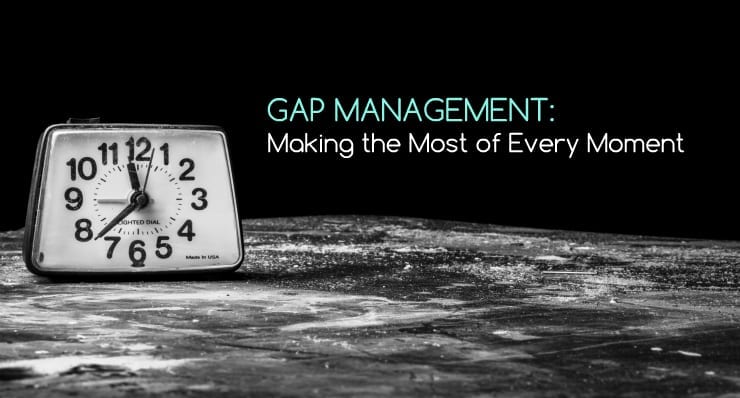 There is no such thing as a spare moment. Every minute I’ve been given must account for something, whether I like it or not. Even the “down time” that is incorporated in my life is not “spare” or “wasted” but intentional and celebrated.
There is no such thing as a spare moment. Every minute I’ve been given must account for something, whether I like it or not. Even the “down time” that is incorporated in my life is not “spare” or “wasted” but intentional and celebrated.
Recently I was on a call with my assistant (the world’s greatest, I am sure if it). She manages my schedule, and without her I am certain I would get 50% less done every day. We were talking about how crammed my schedule is, yet the people I lead and care for are asking for more time. Something has to give – but what?! There is nothing that really could go.
So in order to better manage my calendar and get more in, we talked about the importance of “Gap Management.” This is the idea that the only gaps that exist in my schedule are those that we’ve placed there on purpose. We must avoid cancelations, loose scheduling, or poor planning. Every appointment we make must be well prepared for, tightly scheduled, and firmly followed through. Here are some guiding principles we established:
- All appointments are confirm 24-48 hours in advance. If we don’t confirm an appointment, then it probably isn’t happening. We want to make sure that we don’t lose time by not having the right time, date or place confirmed.
- Have a waiting list. If someone does cancel, we have an ongoing waiting list of people that want to meet or miscellaneous projects that need my attention. In the case that someone cancels, we quickly tuck something else in its place. This is similar to a Doctor’s waiting list. We don’t view it as rude to say, “I’ve confirmed you for the such-and-such a date, but I will put you on the waiting list in the case that something opens up sooner.” If hairstylist can do that, so can pastors.
- Help people understand the cancelation policy. We don’t ever “charge” people for canceling nor do we scold them. However, we are good about communicating that “we need to know 24-48 hours in advance if you are going to cancel your appointment so that we can fill it with someone else that needs some time with Josh.” We also make them aware that if they cancel, there may be more than a two week wait to get back on the schedule again.
- Bold isn’t always rude. We have learned that being bold with people about scheduling doesn’t have to be rude. People are run by their schedules, so being clear with expectations is understood. We are are all busy and time is our most valuable resource. It is okay to be bold about boundaries and requests when you are about to give someone your time.
- Boundaries are always clarified. We are clear about about the start and stop time of every appointment. Most of my meetings are only 30 minutes, phone calls are 15 minutes, and my counseling sessions are only 60 minutes. By telling people the start and end time, we are more likely to avoid gaps and they understand the boundaries going into the meeting.
- If it doesn’t have to be a meeting, don’t make it one. Just because someone asks for a meeting, that doesn’t mean that a meeting is the best thing for them. They may not know that it will take weeks to get that on the books, but a call could be done tomorrow. If something doesn’t have to be a meeting, we try hard to avoid it from becoming one.
So those are a few things we are doing to manage the gaps in my schedule well. At the end of the day, I am here to serve God by loving on people. One of the best ways that I can do that is to management my every moment well.







![Where is God when Discouragement Sets In? [Sermon]](https://joshweidmann.com/wp-content/uploads/2022/06/paola-chaaya-eAkjzXCU0p0-unsplash-180x135.jpg)

![How to Help Kids with Anxiety [video]](https://joshweidmann.com/wp-content/uploads/2020/07/mladen-borisov-RzbUUaP2JXY-unsplash-180x135.jpg)



